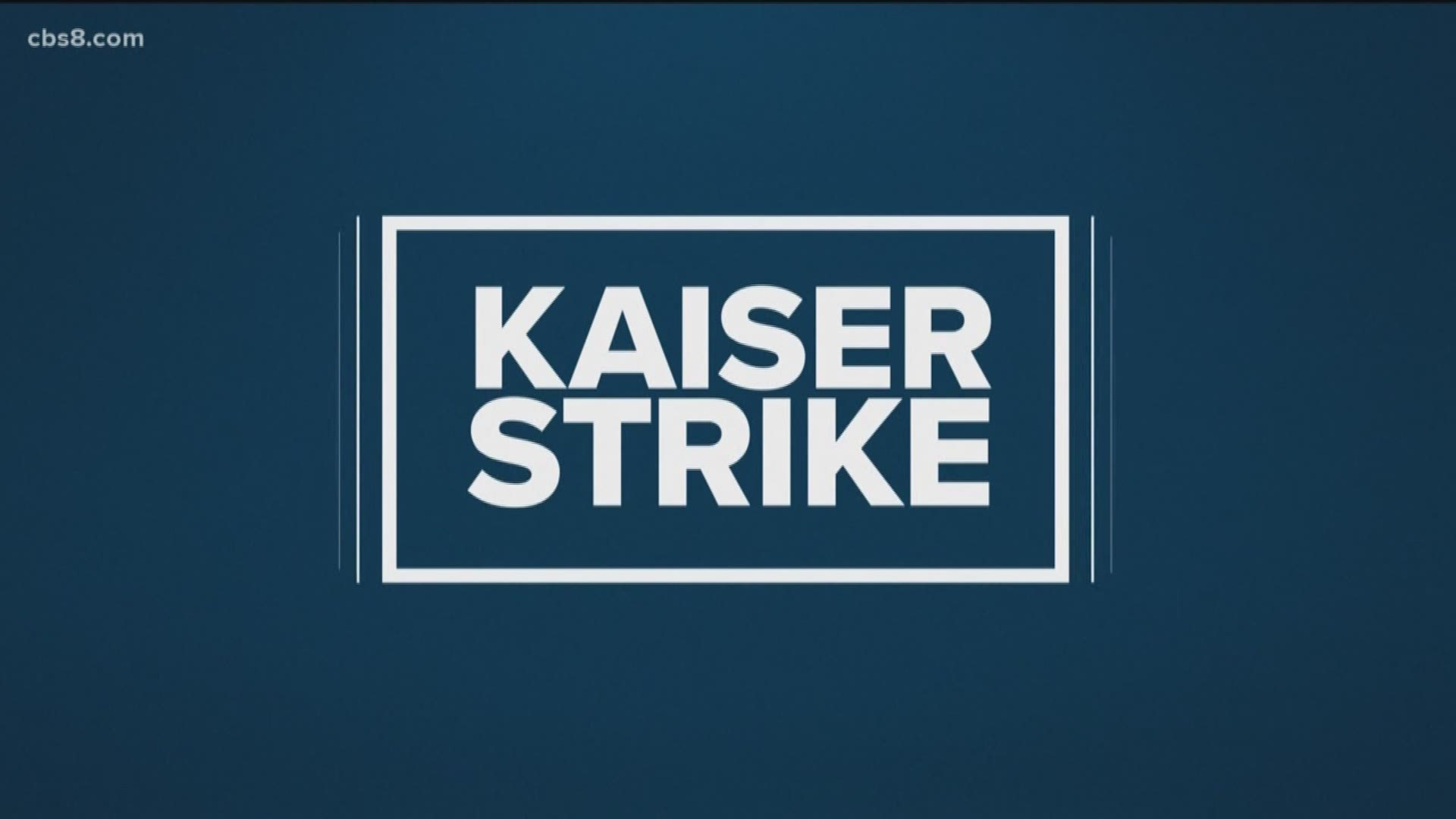SAN DIEGO — San Diego County-Wide Mental Health Resources:
San Diego County Information Line: 211
National Suicide Prevention Lifeline: 1-800-273-8255
____________________________________________________________
Thousands of mental health professionals at Kaiser Permanente facilities in San Diego and across the state hit the picket lines Monday, beginning a five-day strike amid a continued labor standoff.
The walkout by the National Union of Healthcare Workers, representing roughly 4,000 psychologists, therapists, psychiatric nurses and other healthcare employees, had been planned in November but was delayed out of respect following the death of Kaiser CEO Bernard Tyson.
At the protest outside the Kaiser on Clairemont Mesa Boulevard, the emphasis was the impact on patient care and the need for increased staffing.
Union officials said the walkout could result in the shutdown of more than 100 Kaiser clinics and medical facilities "from San Diego to Sacramento." Kaiser officials insisted they were doing everything they can to minimize disruptions to patients, but acknowledged that some appointments may need to be rescheduled.
NUHW accused Kaiser of forcing clinicians to "accept significantly poorer retirement and health benefits than Kaiser provides to more than 120,000 other employees in California."
"Mental health has been underserved and overlooked by the Kaiser system for too long," Ken Rogers, a Kaiser psychologist, said in a statement released by the union. "We're ready to work with Kaiser to create a new model for mental health care that doesn't force patients to wait two months for appointments and leave clinicians with unsustainable caseloads."
But Kaiser officials condemned the walkout, saying the sides have been working with a neutral mediator who recently proposed a compromise, which the union rejected.
"This is NUHW's sixth noticed strike within a single year," said Annie Russell, chief operating officer of Southern California Permanente Medical Group. "We believe that NUHW's repeated call for short strikes is disruptive to patient access, operational care, and service and is frankly irresponsible.
"... A strike does nothing to help our important work to advance care, nor does it help us achieve a mutually beneficial contract," Russell said. "All it does is put our members in the middle of bargaining, which is not fair to them, especially during the holidays when rates of depression can spike and our patients are counting on their caregivers to be there.
"Rather than calling for a strike, we ask that NUHW's leadership continue to engage with the mediator and Kaiser Permanente to resolve these issues."
NUHW workers also held a five-day statewide strike last December. Union leaders claim that mental-health clinics continue to be understaffed and "patients are routinely forced to wait six to eight weeks for therapy appointments and clinicians are so overbooked that they have to work after hours trying to help patients who can't wait for care."
Union officials said they also want other safeguards written into their contracts, such as ensuring clinicians have time to "do their jobs well, which includes being able to chart patient encounters, communicate with social service agencies and respond to calls and emails from patients who can't be seen." The union also called for "crisis services" in all clinics so patients "don't have to be unnecessarily hospitalized and clinicians don't have to cancel appointments to treat patients in desperate need of care."
Nathan Aish is a family therapist with Mental Health America of San Diego, a non-profit and the country's first mental health advocacy organization. While he agrees that mental health professionals are overworked and services are under-staffed on a system-wide level, staging a strike the week before Christmas and the the end of a decade, when more people are taking stock of their lives, is particular difficult time for patients.
"This is our season for mental health. We tend to see a significant increase around the holidays. We see a significant rise in anxiety and depression, especially depression and suicidal thoughts," said Aish.
Kaiser said it will provide replacement mental health workers during the strike, but Aish said the disruption in continuity of care take a serious toll on patients.
"The last thing you want at Christmastime, if you are suicidal or depressed or have anxiety, is to have to talk to a person who does not know anything about you," said Aish.
FULL statement from Kaiser Permanente:
"Despite the National Union of Healthcare Workers’ (NUHW) decision to strike, it is important our Kaiser Permanente members know that our hospitals and medical offices remain open. Our commitment to patients comes first. We are working hard to deliver the high-quality care and services members and patients need. Anyone in need of urgent mental health or other care will receive the services they require. If necessary, we will call members to reschedule some nonurgent appointments. We apologize for any inconvenience caused by this unnecessary strike.
We have been jointly working with an external, neutral mediator to help us reach a collective bargaining agreement with the NUHW. The mediator recently delivered a proposed compromise to both sides that we are seriously considering; however, the union has rejected it and announced plans to strike instead of working through the mediation process.
This is NUHW’s sixth noticed strike within a single year. We believe that NUHW’s repeated call for short strikes is disruptive to patient access, operational care, and service and is frankly irresponsible. Although Kaiser Permanente will make every effort to minimize patient disruption, we are again forced to devote valuable resources needed elsewhere in our organization to instead address the continuity of care and our operations while these employees strike.
A strike does nothing to help our important work to advance care, nor does it help us achieve a mutually beneficial contract. All it does is put our members in the middle of bargaining, which is not fair to them, especially during the holidays when rates of depression can spike and our patients are counting on their caregivers to be there.
Rather than calling for a strike, we ask that NUHW’s leadership continue to engage with the mediator and Kaiser Permanente to resolve these issues."

